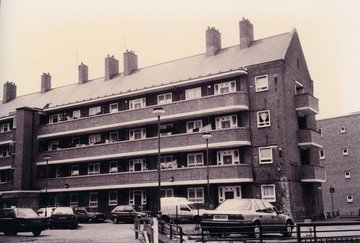
Bengali Squatters’ Movement
‐
Bengali migrant communities in East London resorted to squatting in the face of racial discrimination and violence
Location(s)
Brick Lane, East End of London, Tower Hamlets; East London Mosque; Spitalfields, east London, E1.
Pelham BuildingsWoodseer Street
Shoreditch
London
E1
United Kingdom
About
The Bengali Squatters’ Movement was part of a broader squatters’ movement in the UK in the 1960s, 1970s and 1980s, when people moved into squats as a challenge to social norms. Squatting was possible because it was not criminalized until 2012. However, the Bengali Squatters’ Movement was born of particular social and racial injustices faced by the Bengali migrant community in east London, who squatted as a form of social action against institutional racism and hate crimes. As well as the targeted violence of organizations such as the National Front, a lack of housing and discriminatory practices embedded in council housing distribution meant that many Bengali families had to move into squats. Their squats emerged in the areas around Spitalfields and Shoreditch in the London borough of Tower Hamlets. They created a community and social network, which laid the foundations for the concentration of Bangladeshi culture in Spitalfields today, particularly around Brick Lane, also known as ‘Banglatown’.
In the squats, living conditions were very poor and the Bengali community had to organize defence groups to patrol and protect themselves from racist attacks. The scale of the movement is also often highlighted by the occupancy of Pelham Buildings, which homed an astounding 200 families in this period. As Shabna Begum, the leading researcher on the subject, has shown, women were prominent in the movement, shielding their squats from outside hostility. Community and home building were therefore made possible in the squats, despite the everyday racism they had to endure. A school, the East End Community School, was even established in 1977 in one of the squatted settlements, as a way to preserve Bengali heritage. The squats were more than a temporary form of accommodation; they were a mode of political resistance, a cultural movement and community action force.
The Bengali Squatters’ Movement also intersected with the work of the British Black Power Movement. With the fallout of the British Black Panther Movement in 1973–4, the Race Today Collective (an initiative which emerged from the Black Panthers in the UK) supported the Bengali Squatters’ Movement and helped mobilize them into a political campaign. In particular, Mala Sen, Farrukh Dhondy and Darcus Howe, key members of the British Black Panther Movement, became involved in the plight of the Bengali squatters and encouraged them to create the Bengali Housing Action Group (BHAG) in 1976. Over fifty squatting families were represented in the BHAG and through their protests they achieved a ‘housing amnesty’ from Tower Hamlets Council and the Greater London Council. Other community housing cooperatives continued to lobby for housing rights. In 1985 Helal Uddin Abbas became the first Bangladeshi councillor for the Labour Party in Tower Hamlets. Abbas himself was an active member of the Bengali Housing Action Group and contributed to its success. Despite this positive force for change from the ground up in the history of east London, the British Bengali community continue to face expulsion from their homes today. Communities are threatened by increasing development planned in the Brick Lane area, which is deteriorating its historic migrant culture and identity.
Black Power Movement
British Asian Youth Movements
Housing amnesty granted by the London councils
Save Brick Lane Campaign
Helal Uddin Abbas, Terry Fitzpatrick, Darcus Howe.
Anti Nazi League, Bengali Housing Action Group, Bengali Workers Action Group, East End Community School (EECS), Greater London Council, Indian Workers’ Association, Justice for Tower Hamlets Community Housing, London Squatters Campaign, Mitali Housing Co-op, Race Today Collective, Save Brick Lane, Shahjalal, Socialist Workers Party, Women Unite Against Racism.
Ali, Taj and Begum, Shabna, ‘Here to Stay, Here to Fight: The Bengali Squatters Movement’, Tribune (19 December 2023)
Begum, Shabna, ‘“Here to Stay; Here to Fight”: Bengali Squatters in 1970s Tower Hamlets’, in Alison Blunt and Robyn Dowling (eds) Home (London: Routledge, 2022), pp. 290–3.
Begum, Shabna, ‘What Brick Lane’s Bengali Squatters Can Teach Us about Gentrification’, Open Democracy (15 March 2023), https://www.opendemocracy.net/en/brick-lane-bengali-squatters-east-london-gentrification/
Begum, Shabna, From Sylhet to Spitalfields: Bengali Squatters in 1970s East London (London: Lawrence & Wishart, 2023)
Hayes, George, ‘From Sylhet to Spitalfields: Brick Lane Author Shabna Begum on Bengali Squatters’ Fight against Racism’, Roman Road LDN (13 April 2023), https://romanroadlondon.com/sylhet-to-spitalfields-shabna-begum-author-interview/
Kehoe, Cormac, ‘Bengali Squatters Movement: Can the Lessons of the Past Help ‘Save Brick Lane’ Today?’, Whitechapel LDN (11 July 2022), https://whitechapellondon.co.uk/bengali-squatters-movement-brick-lane/
Naibur Rahman, Md and Wasata, Ruhun, ‘From Sylhet to Spitalfields: Bengali Squatters in 1970s East London – Review’, LSE Blogs (29 April 2024), https://blogs.lse.ac.uk/lsereviewofbooks/2024/04/29/book-review-from-sylhet-to-spitalfields-bengali-squatters-in-1970s-east-london-shabna-begum/
Bee, Bob, ‘Credo’ (1978), British Film Institute, https://player.bfi.org.uk/free/film/watch-credo-1978-online
Heaven, Simon, ‘Defending a Way of Life’ (1980), British Film Institute, https://player.bfi.org.uk/free/film/watch-defending-a-way-of-life-1980-online
Heaven, Simon, ‘A Safe Place to Be’ (1980), British Film Institute, https://player.bfi.org.uk/free/film/watch-a-safe-place-to-be-1980-online
JOU/1, Race Today Publications, 1969–1988, George Padmore Institute, London
‘Oral Histories of the Bengali East End’, Idea Store (2010), Tower Hamlets Local History Library & Archives, London
Image credit
Housing in East End London by John Eade. Courtesy of the Bengali Photo Archive, Swadhinata Trust and Four Corners.
Entry credit
Ellen Smith
